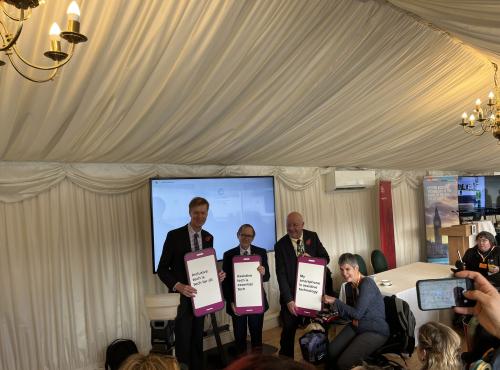Policy Connect on the Budget
In one of the final significant moments of this Parliament, Chancellor Jeremy Hunt has attempted to address the Government’s political and economic challenges with a budget that included important indications about the UK’s future approach to skills, sustainability, and healthcare.
Despite recent forecasts from the OBR curtailing plans for eye-catching pre-election measures, the Chancellor has delivered another 2p cut in national insurance that reflects the Government’s limited fiscal headroom and need to incentivise work.
With an identical measure in the Autumn Statement failing to shift polling, and the cut likely to be delivered through stealth taxes and a further squeeze on public spending after the next election, the most important impact of this Budget is to place Labour in a more difficult fiscal position if they are to enter Government.
Committed to reducing the tax burden for working families, Labour have pledged to maintain most of the Government’s tax cuts despite the prospect of reduced public spending and the increased strain it places on the party’s fiscal rules.
Whilst the national insurance cut will have a significant lasting effect, the Chancellor also announced important spending decisions in policy areas key to Britain’s future prosperity.
Seeking to unlock the economic opportunities of AI by boosting productivity and encouraging innovation, the Government has introduced a new £7.4 million upskilling fund pilot to help SMEs develop AI skills of the future. The announcement comes as the All-Party Parliamentary Group on Data Analytics launches its next inquiry on ‘Skills in the Age of AI’, co-chaired by Daniel Zeichner MP, Lord Holmes, and Lord Tim Clement-Jones.
The inquiry follows the recent release of the All-Party Parliamentary Manufacturing Group’s Upskilling Industry report. Plans for the £50 million Apprenticeship Growth Sector pilot are welcome, with funding boosted for providers delivering 13 high-value apprenticeship standards in manufacturing, green and, life sciences sectors.
Alongside funding that may aid measures to address Britain’s economic stagnation, the Chancellor also attempted to address several persistent sustainability and healthcare challenges.
The Government’s decision to extend the windfall tax is likely to raise a further £1.5 billion and follows the latest event in Carbon Connect’s Energy Security series. Across three events, sector experts have discussed consumer affordability, support schemes, and the importance of balancing supply and demand in a future energy system.
The introduction of a vaping levy to discourage non-smokers from taking up electronic cigarettes is welcome, yet the budget fails to address the increasing pressures faced by the NHS and adult social care system.
Amidst a prolonged NHS workforce crisis, Policy Connect are launching the All-Party Parliamentary Health Group Workforce Series to explore these challenges. The first of these events will take place in Parliament on 19 March and explore the potential for a long-term adult social care workforce plan. If interested in attending, please contact lavanya.rangarajan [at] policyconnect.org.uk (lavanya[dot]rangarajan[at]policyconnect[dot]org[dot]uk).
After delivering successive national insurance cuts and a range of important funding announcements, the Budget may have laid the foundations for an Autumn Statement that includes income tax cuts.
Perhaps more importantly, the Chancellor and Prime Minister will hope that today’s announcements have begun a process of shifting the public’s view on the performance of Britain’s economy and Government before the General Election.



